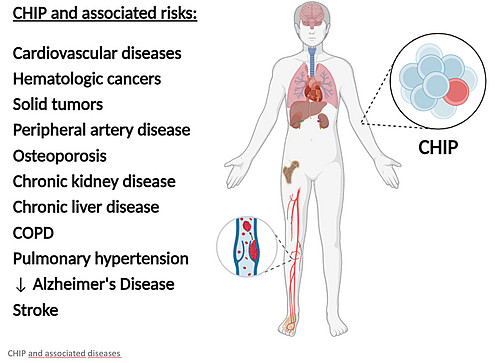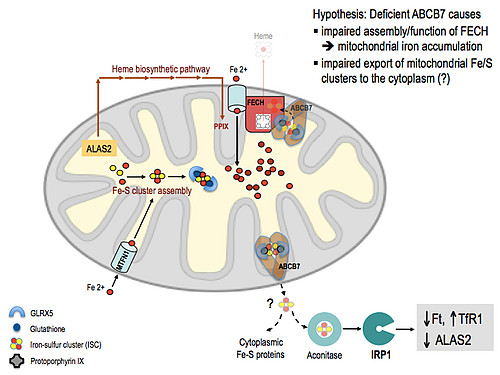MDS-Research - Projects
For over 40 years, the Düsseldorf MDS group has been working on numerous aspects of myeloid neoplasms, such as epidemiology, pathophysiology, diagnosis, classification, assessment of prognosis and therapy of patients with myelodysplastic syndromes and related diseases.
Based on the bioregistry project, which includes the Düsseldorf MDS Registry and the associated biobank, we have the opportunity to work on clinical issues and laboratory studies. The biobank stores blood and bone marrow material (cells, DNA and serum) from over 1600 patients and the MDS registry comprises data from over 9000 patients and has been used for many years for scientific projects.
Many MDS centers from university centers, as well as from hospitals and private hematology institutions share data and material using a unique data set for clinical annotation of the patients. This projects is supported by the „Deutsche Krebshilfe“ as well as from pharmaceutical industry, in particular BMS, Abbvie, and Jazz. The GWT acts as a formal sponsor, our Department being clinical lead (PD Dr. Strupp and Michael Wulfert, Dr. rer.nat.).
The extraordinarily extensive material sets combined with the associated clinical data are also a prerequisite for collaborations in numerous projects with other MDS centers within the MDS D A CH group (Germany, Austria, Switzerland), the European Leukemia Net, the HARMONY projects, the International MDS working group, and other cooperation partners. The Düsseldorf MDS group consists of clinicians scientists, diagnosticians, study coordinators, student assistants, medical doctoral students and informatical and biological doctoral students.
Besides that clinical trials for patiens either as IIT or in collaboration with pharmaceutical industry are run at our department.
CHIP Research - Clonal hematopoiesis of indeterminate potential (CHIP) is at the crossroads of ageing, cardiovascular disease, and cancer, as it can progress to a myelodysplastic syndrome (MDS) or acute myeloid leukemia (AML). In our research we will use different sequencing techniques (eg, Whole Exome Sequencing and Whole Genome Sequencing) to identify patients with CHIP who may be prone to develop hematological malignancy and/or cardiovascular complications. This will include patients with germline mutations in the BRCA1/2 cancer predisposition genes who seem to be particularly prone to develop clonal hematopoiesis after chemotherapy and/or treatment with PARP inhibitors. In addition, individuals experiencing premature cardiovascular diseases but not presenting the typical risk factors will undergo screening for mutations associated with CHIP. Machine learning will be used to correlate the clinical course of disease with patterns of mutational and cytogenetic clonal evolution, harnessing cytomorphologic, histopathologic, and chromosomal data, as well as follow-up assessments of variant allele fraction (VAF).
Pathophysiology of the ring sideroblastic phenotype - Our aim is to decifering the pathophysiology of the ring sideroblastic phenotype (mitochondrial iron overload of erythroblasts) in patients with myelodysplastic syndromes (MDS). Furthermore, we are investigating hematopoetic stem cell differentiation, particularly under the influence of inhibition of the NEDDylation pathway with Pevonedistat, and we are searching for new prognostic biomarkers in MDS using multicolour immunhistochemistry on a tissue microarray.
MDS Bioregistry project
The bioregistry project funded by Krebshilfe is coordinated by PD Dr. Strupp and ensures data collection and thus clinical annotation of the biobank samples, which are frozen and pseudonymized by Dr. rer. nat. Wulfert and with the help of Mrs. Koch. The incoming MDS samples are cytomorphologically diagnosed in a standardized mannor and the findings are communicated to the senders on request. The medical students Julia Wallny, Anamaya Fernengel and Larissa Kügler help to transfer the incoming clinical findings to the MDS register and export the data so that it can be used for the projects of cooperation partners. Cooperation partners who would like to use data and/or material from the bioregister project for scientific projects can submit a short project outline with an informal application so that data and, if necessary, material can then be sent to the respective partner (Lead: Prof. Dr. med. Norbert Gattermann)
| List of cooperative Centers in the MDS Registry |
| Dr. Schulte & Colleagues - Gefos Dortmund |
| Prof. Haase & Colleagues – University Göttingen |
| Dr. Nusch & Cl – Velbert |
| Prof. Giagounidis – Marienhospital Düsseldorf |
| Dr. Rech – Klinikum Erlangen |
| Dr. Streuer – Mannheim University |
| Praxis Dr. Heiders – Düsseldorf |
| Dr. Galonska – MVZ Neuss |
| Dr. Katja Sockel – Dresden University |
| Dr. Glück-Wolf – Klinikum Winnenden |
| Prof. Brümmendorf – Aachen, University |
| Dr. Liebler – Klinikum Aschaffenburg |
| Dr. Gärtner - Hannover |
| Dr. Fox, MVZ Düsseldorf |
Cooperative centers from Austria and Swizzerland (D-A-CH group)
- Prof. Valent, University Wien
- Prof. Pfeilstöcker, Hanusch Spital Wien
- Prof. Stauder, University Innsbruck
- Dr. Krieger, Barmherzige Brüder Spital Linz
- Prof. Sabine Blum, University Lausanne
- Dr. Stefani Parmentier, Claraspital Basel
- PD Dr. Silzle, Kantonsspital St Gallen
- Prof. Bonadies, Bern
- Dr. Tüchler, Hanusch Spital Wien
German cooperative centers in the D-A-CH MDS group
- Prof. Katharina Götze, PD Dr. Anna Hecht, TU University Munich
- Dr. Mazzeo, Dr. Shirneshan, Dr. Treiber, University Göttingen
- Prof. Nowak, Mannheim University
- Prof. Lübbert, Freiburg University
- Prof. Khandanpour, Dr. Ölschläger, University Schleswig- Holstein
Dynamic changes of prognostic parameters for patients with MDS
This project focuses on the fact that almost all clinical and biological disease parameters change over time and may become more or less important prognostically. Annika Kasprzak, MD is working on tools that enable prognostic assessment repeatedly over the course of the disease.
Post cytotoxic myeloid neoplasia
This project focuses on patients who developed myeloid neoplasia after cytotoxic treatment or exposures (Lead: Andrea Kündgen MD, Malika El Yaouti MD). In the context of the Harmony projects (www.HARMONY-Alliance.eu), data and material from those patients is analyzed with regard to assessment of prognosis and development of treatment strategies.
Validation of molecular prognostic scores
IPSSM, AIPSS, CPSSM) and correlation between somatic mutations and hematological characteristics. (Lead: Felicitas Isabel Schulz MD, Carolin Kellersmann). This project validates prognostic scores for patients with MDS taking into account missing parameters in the clinical routine setting.
Refinement of prognostic and classification tools
(Lead; Kathrin Nachtkamp MD, cand. meds: Maja Vukelja, Lisa Lanfermann, Claudia Roggenbuck, Alena Dalgic, Katharina Rauhe, Darina Syankova-Popova, Anna Sztatelmann, Jonas Welsch, Jan Bader). These projects are concerned with the further development of prognostic tools, in particular cytogenetic and clinical tools. A close collaboration with the Institute of Human genetics allows refined analyses of prognostic meaning of chromosomal aberrations, especially in the intermediate risk groups of MDS.
In addition, we are investigating the influence of different therapies on progression behavior and the expected median survival probability, the value of response parameters in patients with myeloid neoplasms. In addition we focus on MDS types MDS with fibrosis together with the institute of pathology, MDS with biallelic TP53 alterations in a real-life setting.
Project: „Leveraging longitudinal data for personalized risk assessment and clinical decision“ (Doctoral Thesis Jonathan Bobak, MSc.)
Traditional patient risk assessment puts major focus on predictions at crucial time points like admission or disease progression.
However, we nowadays generate large amounts of longitudinal data in the clinical routine which remain largely unused for this task.
We aim to remedy this by combining machine-learning and longitudinal data collection to train models which can serve as decision support systems in the clinical routine with dynamic adjustments of predictions based on newly available data.




